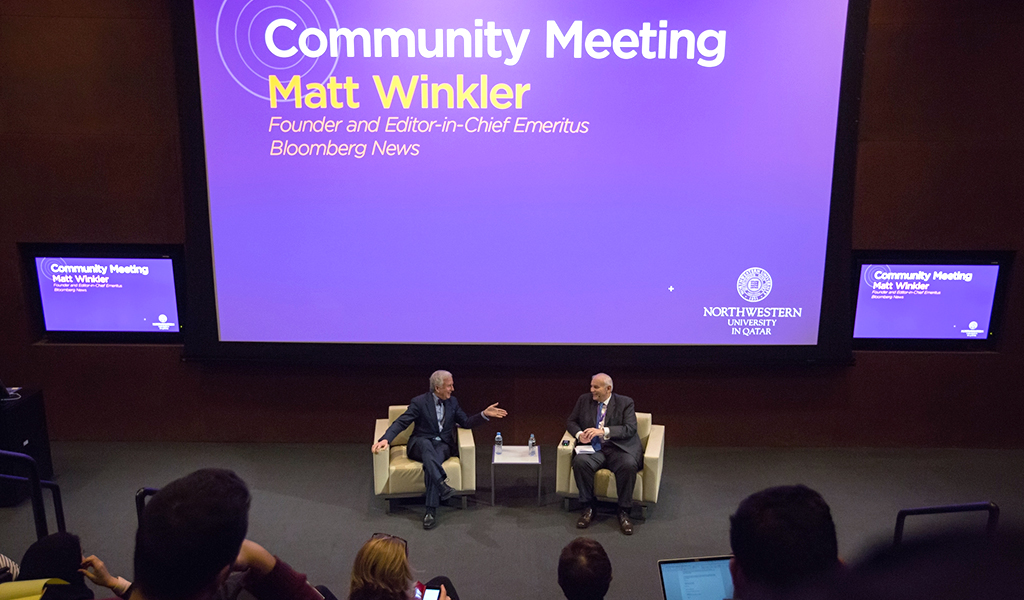The importance of business news at NU-Q
In a special conversation at Northwestern University in Qatar (NU-Q), faculty and students learned how serendipity and the connection between a business leader and a journalist resulted in the founding of one of the most respected business and financial news organizations in the world – Bloomberg News.
The co-founder and emeritus editor-in-chief of Bloomberg News, Matthew Winkler, shared his personal journey to success, from the days when he was a reporter at The Wall Street Journal, to the moment he received a call from Bloomberg founder, Michael Bloomberg, asking him to start the news chapter of his financial organization.
“It’s not often that we get, in these precincts, a true visionary who actually created something that went on to have an enormous impact around the world,” said Everette E. Dennis, dean and CEO. “We are fortunate to have had the chance to learn, first-hand, about the history of Bloomberg News and its future direction.”
In 1989, Winkler published a story in the Wall Street Journal about the future of financial data and information technology, and how these fields were poised to undergo massive change as a result of the disruption that technology was going to create.
Several months later, he received the call from Bloomberg that changed his life.
“I believed that technology would provide people with instant access to data and that would revolutionize how people got their information,” said Winkler. “Bloomberg was doing something that no news company had sought to do – take information from their archives and put it on a computer.”
Winkler explained the challenges he faced as an entrepreneur with a small team, competing against media organizations that had hundreds of staff reporters and solid reputations in the market. What he recognized, however, was that the media landscape consisted of outlets providing breaking news updates and other offering more in-depth, text-heavy reporting. This, Winker pointed out, left a gap for the creation of a media company that was able to provide both long-form reporting and breaking news.
“We were the Internet before there was any Internet, because we were 24/7, real time, and we did everything. We did the shortest of stories and the longest stories,” said Winkler.
Winkler attributed Bloomberg News’ trustworthy reputation to the five F’s that guide its reporters: “To stay in the news business you want to be the first word, the fastest word, the factual word, the final word, and the future word,” he said.
Bloomberg News’s ultimate goal was to become an indispensable source for business news, and to provide consumers with the updates they need when they need them. “We were offering a combination of market news, company updates, and every other newspaper’s news stories,” Winkler added.
Winkler also addressed a series of questions from NU-Q’s students and faculty about the rise of fake news, citizen journalism, and the challenges they can expect in this fast-paced era of social and digital news.
“We’re dealing with some unprecedented things in our lifetime; for one, people can say anything and it is circulated instantly around the world – to better or ill effect,” said Winkler. “Due diligence and careful assessment of news is especially critical at this time, and it is an emphasis on the need for trusted media organizations that can provide facts and fair reporting.”

